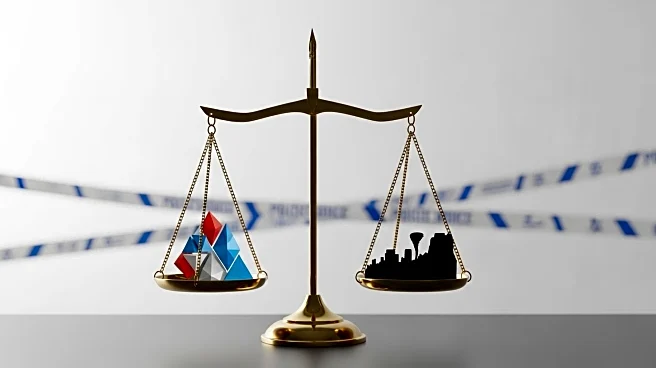What is the story about?
What's Happening?
The United Nations has expanded its blacklist to include 68 additional companies from 11 countries, citing their involvement in activities that allegedly violate Palestinian human rights through business ties to Israeli settlements in the occupied West Bank. The list now comprises 158 companies, predominantly Israeli, but also includes firms from the United States, Canada, China, Britain, France, Germany, Spain, Portugal, the Netherlands, and Luxembourg. The UN Human Rights Council, which initiated the list, aims to 'name and shame' businesses linked to the settlements, considered illegal under international law by many. The council's resolution, passed nearly a decade ago, has faced criticism from Israel, which rejects the list as a 'blacklist against businesses that have committed no wrongdoing.' The list includes companies involved in construction, security, travel, and financial services, among others.
Why It's Important?
The expansion of the UN blacklist highlights ongoing international scrutiny of business activities in Israeli settlements, which are a contentious issue in the Israeli-Palestinian conflict. The inclusion of major companies, such as Expedia Group and Airbnb, underscores the potential impact on global business operations and reputations. This development may further isolate Israel diplomatically, especially as some European countries have recognized an independent Palestinian state. The blacklist could influence corporate strategies, prompting companies to reassess their involvement in the region to avoid reputational damage and potential economic repercussions. The move also reflects broader international efforts to address human rights concerns in conflict zones.
What's Next?
The UN Human Rights Council's list is likely to continue evolving, with hundreds of other companies potentially under review for future inclusion. Companies currently on the list may face pressure to disengage from activities in the settlements or to address human rights concerns proactively. Israel's government may respond with diplomatic efforts to counteract the blacklist's impact, while businesses may seek to clarify their roles and responsibilities in the region. The situation could lead to increased international dialogue on the legality and ethics of business operations in conflict areas, influencing future policy decisions and corporate governance standards.
Beyond the Headlines
The UN blacklist raises ethical questions about corporate responsibility in conflict zones, challenging businesses to balance profit motives with human rights considerations. The list's expansion may prompt broader discussions on the role of international organizations in regulating business practices and the effectiveness of 'naming and shaming' as a tool for promoting human rights. Additionally, the situation highlights the complexities of international law and the varying interpretations of legality concerning Israeli settlements, potentially influencing future diplomatic and legal frameworks.














